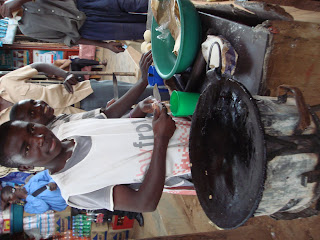In the morning I will be picking up Trev, so I thought I would get a quick blog in while I still have a moment.
It has been four weeks, since we landed in Entebbe. In some ways it feels like it has been 4 days, and in other ways it feels like 4 months have passed. Hopefully time slows down a bit, and we are able to get what we need done- done.
I am happy to report that everything with the HIV Awareness Day is moving along well, and we can’t wait for October 2nd to come along! We have t-shirts made for volunteers(which will also be part of the awareness, as they have the theme of the day “know your status” printed on the back.) The banners just arrived about an hour ago from Brian, one of the local boys who has been incredibly helpful throughout the planning process. The most important part of the day will be getting as much people out to be tested as possible, so getting the word out is key. As per guidance received, and looking at what volunteers did last year, we are setting a banner up in the community a week before the event. The banner advertises the free testing, and entertainment. We have printed 2000 flyers, which we will be delivering around the community, along with the peer educators, who are local women that work together to support a healthy and safe community in Namuwango.
*Sidenote*Oh my goodness, a rat just ran by my feet, under the table and to the bathroom. Gross.
The day before the event, we are planning a “drive by.” This is a popular attraction here, where we will take a vehicle and drive up and down the roads of the community, playing music and reminding everyone to come and attend the event with mega-phones. Should be an experience!
Last night, we were also able to confirm the entertainment with a local group called Bavabuka. We were invited to a ‘meeting’ to get to know a few of the members, and finalize plans. This meeting ended up being a weekly hip-hop freestyle, open-mic type event, called Bonfire. They started with poetry, and then all of a sudden there was acrobatics, dancing, rap, you name it. Each of the amateurs on the stage were incredible, as we just sat and watched, being reminded of how much rhythm we do not have! When I get home I will be sure to post some videos.
So, yah. If you are in Kampala the weekend of October 2, you don’t want to miss out! Other than planning for the day, we have taken the task of sorting and distributing the extremely unorganized and completely random storage room of donations. Massive bags of old clothes, new clothes, hole-y clothes, toys, uniforms, christmas decorations, women’s lingerie (??), golf club covers, you name it! We have been able to give away most of the clothes and uniforms to the UH4H children and families, as well as another small local school in the same area. Now, we are sorting through toys, and craft stuff, setting aside bags for Christmas gifts, and making sure that there is a basic inventory of what is left over. We really had no idea what we were getting into when we agreed to take on the storage room. Actually, the only reason we took this on was because we were looking for the banners that they used for the HIV Day last year (which were NOT in the room, and are nowhere to be found!) When we saw the state of the room, we said we would work on it as it could use a few days of cleaning and organization.....almost a week later, and let’s just say we’re getting there.
 | |
| Immaculate |
One of the highlights we have had in doing this task, is a young girl (6-7yrs?) named Immaculate who has been helping and entertaining us as we work. Because she has a disability, she is not able to attend a local school as schools in Uganda do not practice inclusion. However, she attends the top nursery class at H4H, and will hopefully(sponsorship pending) be able to attend a school for children with disabilities soon. She loves high-5’s, and if you don’t see her swinging, will usually slap you wherever she sees fit. It’s much more amusing when Sarah or Michelle don’t see it coming! I also think she may be the happiest girl I know, as she is always waiting with a beautiful smile and giant hug.
Tomorrow Sarah, Trev, and I are going for a 5 day trek in the Semien Mountains of Ethiopia. We are looking forward to some peace and quiet (unkown here!) but will definitely be missing Uganda and the projects. We will be back just in time to help with final preparations for the HIV Awareness Day. Have a great weekend!
Blessings,
Chels
PS: The rat is dead.















